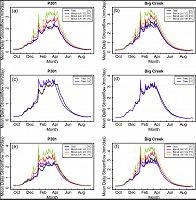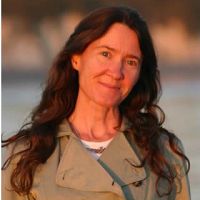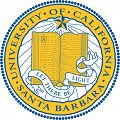Vegetation Matters: Type conversion could impact Sierra stream flow more than changing climate alone
02 Sep 2016
News Source: The Current at UCSB
This is an excerpt of a press release originally published on 30 August 2016 by James Badham, covering a new peer-reviewed article published by SSCZO researchers Ryan Bart, Naomi Tague, and Max Moritz. Click here to read the entire article.
"In California’s Sierra Nevada mountains, as more precipitation falls in the form of rain rather than snow, and the snowpack melts earlier in spring, it’s important for water managers to know when and how much water will be available for urban and agricultural needs and for the environment in general.
While changing precipitation patterns can have a significant impact on stream flows in the Sierra Nevada mountains, a new study by UC Santa Barbara researchers indicates that shifts in vegetation type resulting from warming and other factors may have an equal or greater effect. Their findings appear in the journal PLOS One.
“We found that vegetation change may have a greater impact on the amount of stream flow in the Sierra than the direct effects of climate warming,” said lead author Ryan Bart, a postdoctoral researcher at UCSB’s Bren School of Environmental Science & Management. Bart co-wrote the paper with Bren professor Naomi Tague and fire ecologist Max Moritz, an associate at UCSB’s National Center for Ecological Analysis and Synthesis.
As the climate continues to warm and produce more severe droughts, fires and tree die-off events across the western United States, the potential for widespread vegetation-type conversion is becoming increasingly plausible. ..."
News Source:
READ MORE from The Current at UCSB >>
News Category:
RESEARCH |
INFRASTRUCTURE |
DATA |
MODELS |
PUBLICATIONS |
PEOPLE
People Involved
CZO
-
Sierra, COLLABORATOR
-
Sierra, INVESTIGATOR
Non-CZO
Max A. Moritz - Department of Environmental Science, Policy and Management, University of California, Berkeley.
Publications
2016
Effect of Tree-to-Shrub Type Conversion in Lower Montane Forests of the Sierra Nevada (USA) on Streamflow. Bart, R. R.,Tague, C. L., Moritz, M. A. (2016): PLOS ONE
Discipline Tags and CZOs
Hydrology
Climatology / Meteorology
Biology / Ecology
Modeling / Computational Science
Biogeochemistry
Sierra
Explore Further





